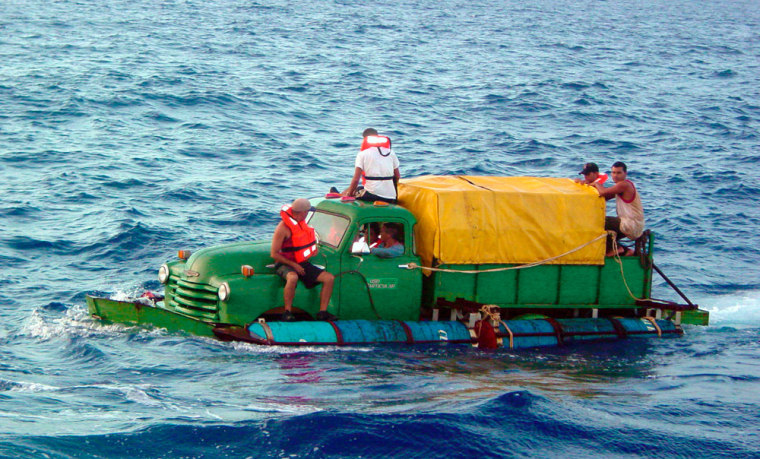A Cuban family that twice tried to reach Florida with vehicles converted into boats has made it to Miami, this time coming overland via Mexico from Costa Rica, the family's lawyer said.
Luis Grass, his wife, Isora Hernandez, and their 5-year-old son, Angel Luis Grass Hernandez, entered the United States though the Texas-Mexico border on March 12.
They were held in custody in Brownsville, Texas until Sunday. They traveled to Miami on Monday after being released on parole for humanitarian reasons. They will be allowed to apply for permanent residence in 2006.
The Grass family's voyage to America began in 2003 when they and others tried to cross the Florida Straits aboard a bright green 1951 Chevy pickup, which Luis Grass had converted into a boat. They were intercepted by the Coast Guard and sent back to Cuba. The Coast Guard then sank the Chevy-boat.
Under U.S. immigration policy, Cubans who reach U.S. shores generally are allowed to stay while those caught at sea are usually returned.
Second attempt with Buick-powered boat
In February 2004 Grass made a second attempt to get to the United States illegally — this time aboard a floating Buick sedan powering another homemade boat.
Again, they were intercepted. This time the Grass family was taken to the U.S. naval base in Guantanamo, and the other would-be migrants aboard the Buick were returned to Cuba. The Buick was sunk.
"If he had to make a choice between the frustration of living in Cuba and the fear of dying at sea, he chose dying at sea," said Wilfredo Allen, the Grasses’ family lawyer.
After interviews showed that the Grass family had a credible fear of persecution if they were sent home, the United States held them at Guantanamo until a third country, in this case Costa Rica, agreed to grant safe haven.
Bus rides, hitchhiking from Costa Rica to Texas
The family lived in Costa Rica until last month, making their way into Mexico and to Texas by bus and hitchhiking.
Allen said the Grass family will "begin the process of legalization," and Luis will apply for a work permit.
Allen said Grass’s "greatest frustration was that he was stuck at sea and he was not able to land in Miami and drive up to the beach."
